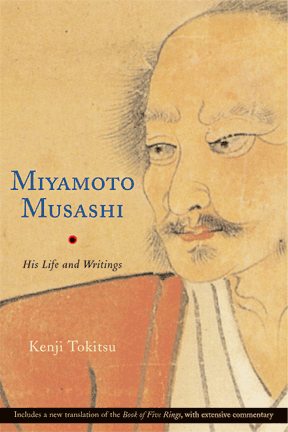The
Iaido Journal Nov 2004
Martial Arts in the Modern World

Review by Colin Watkin. Copyright © Hyoho.com 2004. All
rights
reserved
Book Review: Miyamoto Musashi - His Life and Writings
Author: Kenji Tokitsu
Publisher: Shambhala Boston
& London $34.95
ISBN:1-59030-045-9
The cover of book reflects the contents. Within the book there are some
excellent photographs of Musashi's artwork.
The first chapter of the book is similar to that of the recently
published Lone Samurai by William Scott Wilson Kodansha, so it is
inevitable that I should make comparisons as they both draw on the
historical facts of Musashi's life and exploits. Certain parts are of
course the same, but the authors use different words to describe them.
So perhaps we can say certain things probably happened.
However what first stuck me in comparison was the fact that in some of
the accounts they don't even use the same weapons. This first becomes
apparent when one book states that Arima Kibei used a staff, then in
this book he used a bokuto. Reading on in the duel against a Yoshioka
Seijiro he has a real sword, in this book a bokuto. In the duel against
Yoshioka Denshichiro he has a five foot long sharpened wooden sword,
while this book says a staff with steel rings or a hollowed out staff
with a ball and sickle hidden within. To be honest with such
inconsistencies, not knowing what weapons were used, makes one really
wonder where we can find some actual facts in either books. There is
some confusion over names too. Osedo Hayashi becomes Hayato. These are
all simple Kanji that carry on to this very day and are the names of
the people around me, so there can be no excuse on misreading kanji.
Some nice points are made in Mr Tokitsu's book. He talks of the
illusion of wearing traditional costume, which creates an impression of
living in the past, and the practice of associating this costume with
some newer arts. This gives me another reason for not wearing a uniform
in Hyoho Niten Ichiryu and to try and show its waza through experience
rather than in what I wear.
Chapter two is yet another translation of Gorin no Sho and other brief
translations. Hopefully we may one day see a translation by someone who
actually practices the ryu.
Mr Tokitsu's summary of Musashi's lineage's is already out of date as
people have died. Also it would be incorrect to describe a student of a
student as a separate lineage. Actual records held by Usa Jingu in Oita
show his findings to be inaccurate with regard to the 8th Soke.
To sum up there are a few inconsistancies, but he draws on facts,
translations and comparisons with other Budo to illustrate Musashi's
ideals. The explanation of the Budo ideal in modern terms and his words
on Musashi's Sen will bring new learning to those that know little of
his ways. His description of the transition of old to modern Budo and
other facts offer a general encyclopedia of knowledge to those wishing
to find answers and links to Genbudo.
As Mr Tokitsu states Musashi went from Setsunin (Satsujin) ken to
Katsunin (Katsujin) ken in real times. If someone needs a decent
overall picture of Musashi's life, philosophy and the tradition he
founded, this is it.
An excellent referential source not only about Musashi, but of general
Budo Philosophy.
Colin Watkin teaches high school in Japan and is a senior student
of Hyo Ho Niten Ichiryu.

Our Sponsor, SDKsupplies
